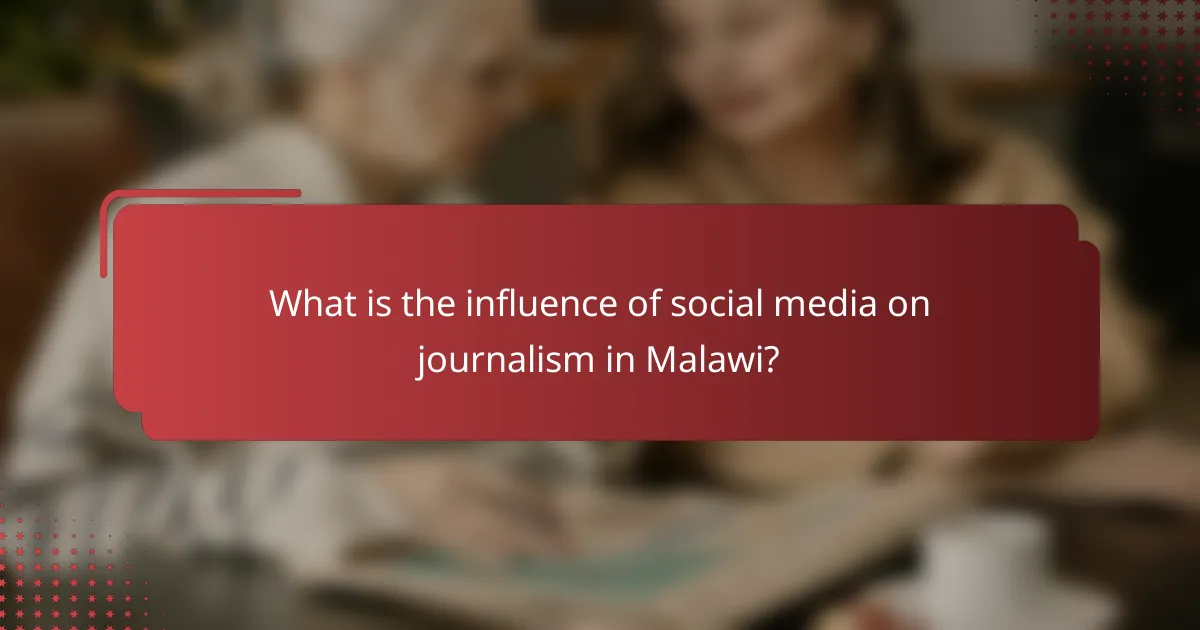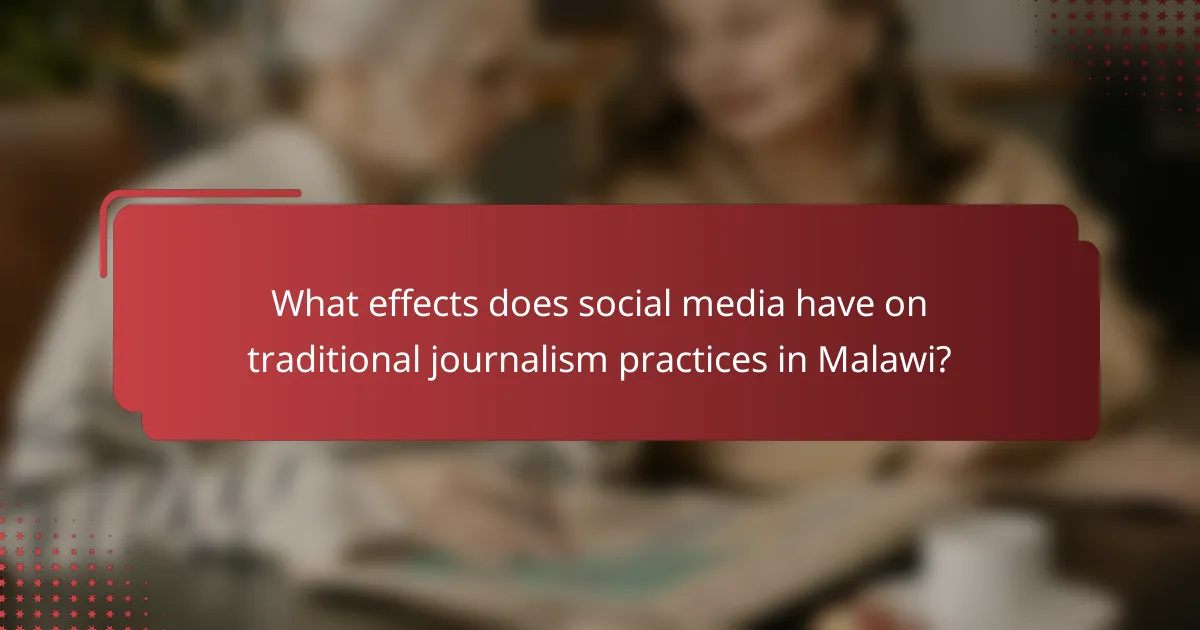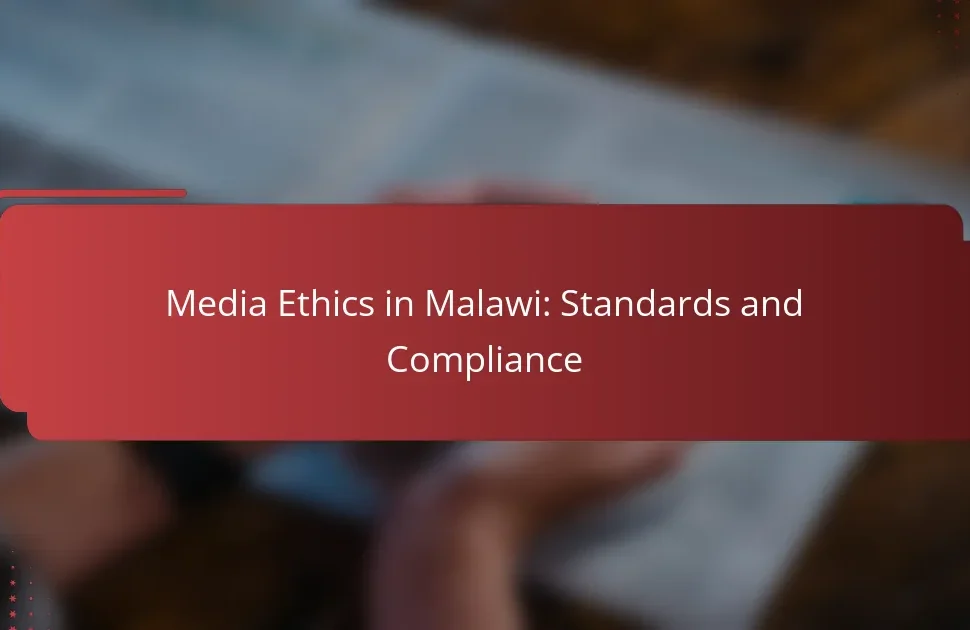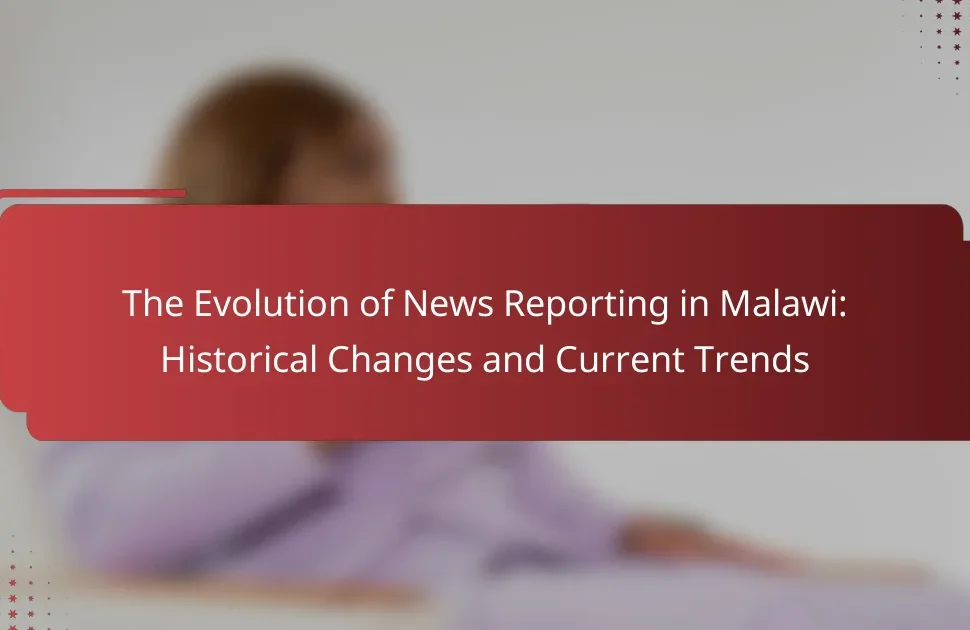Social media has a profound influence on journalism in Malawi, reshaping news dissemination and audience engagement. Platforms such as Facebook and Twitter enable journalists to share updates in real time, enhancing public awareness of current events while also presenting challenges like misinformation. The rise of citizen journalism allows ordinary individuals to report news, impacting traditional media’s gatekeeping role and shifting focus towards trending topics. As social media becomes a primary news source for many Malawians, journalists are adapting their strategies to include these platforms, balancing the need for immediacy with the importance of credibility and quality reporting.

What is the influence of social media on journalism in Malawi?
Social media significantly influences journalism in Malawi by shaping news dissemination and audience engagement. It allows journalists to reach broader audiences quickly. Platforms like Facebook and Twitter facilitate real-time reporting and updates. This immediacy can enhance public awareness of current events. However, social media also presents challenges, such as the spread of misinformation. Journalists must navigate this landscape carefully to maintain credibility. A study by the Malawi Communication Regulatory Authority indicates that social media usage among Malawians has increased, impacting traditional news consumption patterns. Consequently, journalists in Malawi are adapting their strategies to include social media as a key component of their work.
How has social media changed the landscape of journalism in Malawi?
Social media has significantly transformed journalism in Malawi by enhancing information dissemination and audience engagement. Journalists now utilize platforms like Facebook and Twitter to share news instantly. This shift allows for real-time reporting, which was previously limited by traditional media timelines. Social media also enables diverse voices to contribute to the news landscape. Citizen journalism has emerged, with individuals sharing news stories and updates directly from their communities. This democratization of information has increased accountability among traditional media outlets. Additionally, social media provides a space for public discourse, allowing audiences to interact with journalists and share their perspectives. According to a 2022 study by the Malawi Communications Regulatory Authority, over 60% of Malawians access news primarily through social media platforms. This data underscores the growing influence of social media in shaping public perception and journalistic practices in Malawi.
What specific platforms are most impactful in this transformation?
Facebook, Twitter, and WhatsApp are the most impactful platforms in this transformation. Facebook serves as a primary source for news sharing and audience engagement. Twitter allows for real-time updates and interaction between journalists and the public. WhatsApp facilitates the rapid dissemination of information among users. A study by the Media Institute of Southern Africa highlights that over 60% of Malawians access news primarily through social media. This shift has significantly altered how journalism is practiced in Malawi, emphasizing the role of these platforms in shaping public discourse.
How do these platforms facilitate news dissemination in Malawi?
Social media platforms facilitate news dissemination in Malawi by providing rapid access to information. They enable journalists to share updates instantly with a wide audience. Platforms like Facebook and Twitter allow for real-time engagement and feedback from the public. This interactivity enhances the transparency of news reporting. Additionally, social media serves as a space for citizen journalism. Ordinary citizens can report events as they happen, contributing to a diverse range of perspectives. Reports indicate that over 80% of Malawians use mobile phones for internet access, increasing the reach of news. This widespread connectivity allows for the swift spread of information across the country.
What are the key trends in social media usage among journalists in Malawi?
Key trends in social media usage among journalists in Malawi include increased reliance on platforms for news dissemination and audience engagement. Journalists are utilizing Facebook and Twitter primarily for real-time updates. Social media serves as a tool for sourcing information and verifying facts. There is a growing trend of multimedia content creation, such as videos and infographics, to enhance storytelling. Additionally, journalists are increasingly engaging with their audience through comments and live interactions. Studies indicate that 70% of journalists in Malawi use social media daily for reporting. This shift reflects a broader global trend towards digital-first journalism.
How are journalists adapting to the rise of social media?
Journalists are adapting to the rise of social media by integrating it into their reporting practices. They are using social media platforms for breaking news updates. This allows for real-time engagement with their audience. Journalists are also leveraging social media for sourcing information and verifying facts. According to a Pew Research study, 62% of journalists use social media to gather news. Furthermore, they are employing social media analytics to understand audience preferences better. This adaptation enhances their storytelling techniques and broadens their reach. In Malawi, journalists are increasingly utilizing social media to connect with local communities and share relevant news.
What role does citizen journalism play in this context?
Citizen journalism plays a crucial role in the context of social media’s influence on journalism in Malawi. It empowers ordinary individuals to report news and share information through platforms like Facebook and Twitter. This democratization of information allows for diverse perspectives that traditional media may overlook. Citizen journalists often provide real-time updates during events, enhancing the immediacy of news coverage.
In Malawi, citizen journalism has been instrumental in highlighting local issues such as corruption and human rights abuses. A study by the African Media Barometer noted that citizen journalists often fill gaps left by mainstream media, particularly in rural areas. This trend increases public engagement and fosters a more informed citizenry.
Moreover, social media serves as a tool for citizen journalists to amplify their voices and reach wider audiences. The accessibility of smartphones and internet connectivity has further facilitated this shift. As a result, citizen journalism has become a vital component of the media landscape in Malawi, challenging traditional narratives and promoting accountability.

What effects does social media have on traditional journalism practices in Malawi?
Social media significantly impacts traditional journalism practices in Malawi. It facilitates faster news dissemination, allowing journalists to share updates in real time. For instance, platforms like Facebook and Twitter enable immediate reporting of events. This immediacy can lead to a decrease in the time journalists spend on fact-checking. Consequently, the quality of reporting may suffer due to the rush to publish.
Additionally, social media provides a platform for citizen journalism. Ordinary citizens can report news, challenging the traditional gatekeeping role of journalists. This shift democratizes information dissemination but can also lead to the spread of misinformation.
Furthermore, social media influences the topics covered by traditional media. Journalists often monitor trending topics online to tailor their stories to public interest. This trend can shift focus from in-depth investigative journalism to more sensational content.
In Malawi, the rise of social media has led to a more interactive relationship between journalists and audiences. This engagement can enhance accountability but may also pressure journalists to cater to popular opinion rather than objective reporting.
How does social media influence news credibility in Malawi?
Social media significantly influences news credibility in Malawi by shaping public perception and information dissemination. Platforms like Facebook and Twitter allow users to share news rapidly. This immediacy can enhance the visibility of news stories. However, it also increases the risk of misinformation spreading quickly. A study by the Media Institute of Southern Africa found that Malawians often rely on social media for news updates. This reliance can lead to skepticism about traditional media sources. The blending of user-generated content with professional journalism complicates credibility assessments. In Malawi, social media’s role as a news source is growing, impacting how audiences evaluate information reliability.
What challenges do journalists face regarding misinformation?
Journalists face significant challenges regarding misinformation. The rapid spread of false information on social media complicates fact-checking efforts. Limited resources often hinder journalists’ ability to investigate claims thoroughly. Additionally, the pressure to publish quickly can lead to errors in reporting. Misinformation can damage credibility and trust in media outlets. The lack of media literacy among the public further exacerbates the issue. Journalists must navigate a complex landscape of competing narratives. These challenges require ongoing training and adaptation to new technologies.
How are traditional media outlets responding to social media’s impact?
Traditional media outlets are adapting to social media’s impact by integrating digital strategies. They are increasingly using social media platforms to distribute news and engage with audiences. This shift allows for real-time reporting and audience interaction. Many traditional outlets are also hiring social media specialists to enhance their online presence. Data from the Media Institute of Southern Africa indicates that over 70% of Malawian journalists use social media for sourcing news. Additionally, partnerships with social media companies are becoming common to broaden reach. These adaptations help traditional media remain relevant in a rapidly changing landscape.
What are the implications for journalistic ethics in the age of social media?
The implications for journalistic ethics in the age of social media include challenges in accuracy, accountability, and transparency. Social media platforms often prioritize speed over verification. This can lead to the spread of misinformation. Journalists face pressure to produce content rapidly. This urgency can compromise ethical standards. The expectation for engagement can lead to sensationalism. Ethical dilemmas arise when balancing audience engagement with factual reporting. Additionally, the anonymity of social media can embolden unethical behavior. Research indicates that misinformation spreads faster on social media than factual information. This trend poses significant risks to journalistic integrity.
How do social media platforms affect the objectivity of news reporting?
Social media platforms significantly impact the objectivity of news reporting. They often prioritize engagement over accuracy. Algorithms promote sensational content, leading to biased reporting. Journalists may feel pressured to conform to trending narratives. This can result in a lack of thorough fact-checking. Studies show that misinformation spreads rapidly on these platforms. For example, a 2020 study by the Pew Research Center found that 53% of social media users encountered false information. Such dynamics undermine traditional journalistic standards. Consequently, the credibility of news sources can be compromised.
What ethical dilemmas arise from the use of social media by journalists?
Journalists face several ethical dilemmas when using social media. One major issue is the challenge of verifying information. Social media often spreads unverified news quickly, leading to the risk of reporting false information. Another dilemma is the pressure to publish content rapidly. This urgency can compromise journalistic standards and thorough fact-checking.
Additionally, journalists may struggle with maintaining objectivity. Personal opinions can inadvertently influence reporting on social media platforms. Privacy concerns also arise, particularly regarding the sharing of sensitive information about individuals or events.
Furthermore, there is the dilemma of audience engagement versus ethical reporting. Journalists may feel compelled to sensationalize stories to attract attention, which can distort the truth. These ethical challenges are significant as they can impact public trust in journalism.

What are the future prospects for journalism in Malawi influenced by social media?
The future prospects for journalism in Malawi are significantly shaped by social media. Social media platforms are becoming primary sources of news for many Malawians. This shift is leading to a more democratized media landscape. Traditional media outlets are increasingly competing with online platforms for audience attention. Journalists are adapting by using social media for news distribution and audience engagement. The rise of citizen journalism is also notable, empowering individuals to report news directly. However, challenges such as misinformation and lack of regulation persist. Overall, social media is likely to enhance journalistic practices while presenting new challenges in Malawi.
How might social media continue to shape journalism in the coming years?
Social media will continue to shape journalism by enhancing real-time reporting and audience engagement. Journalists increasingly rely on platforms like Twitter and Facebook to share breaking news instantly. This immediacy allows for quicker dissemination of information compared to traditional media. Furthermore, social media enables journalists to interact directly with their audience. This engagement fosters a two-way communication channel, allowing for feedback and discussion. Additionally, social media algorithms influence what news reaches users, shaping public perception. A study by the Pew Research Center found that 53% of U.S. adults get news from social media. This trend underscores the growing importance of social media as a news source. In Malawi, similar patterns are emerging, with social media impacting how news is consumed and shared.
What emerging technologies could further impact this relationship?
Artificial intelligence (AI) could significantly impact the relationship between social media and journalism in Malawi. AI can enhance content curation and personalization, improving user engagement. Machine learning algorithms can analyze audience preferences, allowing journalists to tailor their stories effectively. Additionally, AI-powered tools can assist in fact-checking, combating misinformation prevalent on social media platforms. Blockchain technology may also play a role by ensuring transparency in news sourcing and distribution. This can build trust between journalists and their audience. Furthermore, augmented reality (AR) and virtual reality (VR) can create immersive storytelling experiences, attracting more viewers to journalistic content. These technologies are already being explored globally, indicating their potential relevance in the Malawian context.
How can journalists leverage social media for better engagement?
Journalists can leverage social media for better engagement by actively sharing their stories and connecting with audiences. They should use platforms like Twitter, Facebook, and Instagram to disseminate news quickly. Engaging with followers through comments and direct messages fosters community interaction. Utilizing multimedia content, such as videos and infographics, increases audience retention and interest. Analytics tools can help journalists understand audience preferences and optimize their content accordingly. According to a Pew Research Center study, 62% of adults get news from social media, highlighting its importance in reaching wider audiences.
What best practices can journalists in Malawi adopt for effective social media use?
Journalists in Malawi can adopt several best practices for effective social media use. They should prioritize accuracy by verifying information before sharing. Misinformation can spread rapidly on social platforms. Engaging with the audience is crucial for building trust. Responding to comments and messages fosters a sense of community. Journalists should use multimedia content to enhance storytelling. Visuals can significantly increase engagement rates. Consistent posting schedules help maintain audience interest. Utilizing analytics tools can provide insights into audience preferences. This data can guide content strategy effectively. Collaborating with other journalists can amplify reach and share diverse perspectives. Such practices can enhance the credibility and impact of journalism in Malawi.
How can journalists ensure the accuracy of information shared on social media?
Journalists can ensure the accuracy of information shared on social media by verifying sources before publication. They should cross-check facts with multiple reputable sources. This practice helps to confirm the reliability of the information. Additionally, journalists can utilize fact-checking tools and platforms to assess claims. Research shows that 60% of misinformation can be debunked through proper verification methods. Engaging with experts in relevant fields can also enhance accuracy. Furthermore, maintaining transparency about the sources used builds trust with the audience. These steps collectively contribute to more reliable information dissemination on social media.
What strategies can enhance audience trust in news shared via social media?
Enhancing audience trust in news shared via social media involves several key strategies. First, promoting transparency is crucial. This means clearly stating the sources of information and the methods used in reporting. Second, fact-checking is essential. Organizations should verify information before sharing it. Third, engaging with the audience fosters trust. Responding to comments and questions builds a sense of community. Fourth, providing context for news stories helps audiences understand the background. Research shows that audiences are more likely to trust news outlets that offer detailed explanations. Fifth, using credible sources strengthens the reliability of shared news. Studies indicate that news from established and reputable organizations is viewed as more trustworthy. Lastly, training journalists in ethics and social media best practices ensures high standards in reporting. These strategies collectively enhance trust in news shared via social media.
The main entity of the article is the influence of social media on journalism in Malawi. The article examines how social media platforms like Facebook, Twitter, and WhatsApp have transformed news dissemination and audience engagement, enabling real-time reporting and citizen journalism. It discusses key trends in social media usage among journalists, the challenges of misinformation, and the implications for journalistic ethics and credibility. Additionally, the article explores how traditional media outlets are adapting to these changes and the potential future prospects for journalism in Malawi as shaped by social media dynamics.




